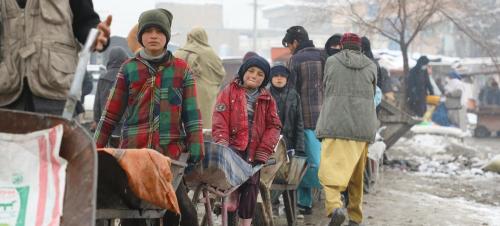World can end ‘downward humanitarian spiral’ of Afghanistan
As the world focuses its attention on the war in Ukraine, the UN reminded the international community on Thursday to remember Afghanistan as it kicked off a pledging conference to save the lives and livelihoods of those in the landlocked country.

The World Food Programme is distributing food to vulnerable familes during the harsh winter in Kabul, Afghanistan.
Despite persistent humanitarian needs sparked by years of conflict and recurring drought, the current situation in Afghanistan is unparalleled, with more than 24.4 million people requiring humanitarian assistance to survive, according to the UN Office for the Coordination of Humanitarian Affairs (OCHA).
Food security levels have plunged at an alarming rate, leaving half the population facing acute hunger, including nine million in a state of emergency food insecurity – the highest number in the world.
Moreover, malnutrition is on the rise, and livelihoods have been destroyed.
Appealing for help
To help mitigate the situation, the Secretary-General António Guterres on Thursday, launched a High-level Pledging Event, Supporting the Humanitarian Response in Afghanistan – co-hosted by the United Kingdom, Germany and Qatar.
Last year, as the country faced profound turmoil and international isolation, donors showed remarkable generosity for Afghans.
A $1.8 billion disbursement to aid groups was able to assist 20 million people with life-saving food, clean water, healthcare, shelter and education.
International donors are asked to keep the funds flowing and growing again this year.
The UN-coordinated relief operation – the largest but not the only one in Afghanistan – is appealing for $4.4 billion, three times the amount requested in 2021.
Afghans ‘selling body parts’ to survive
“Without immediate action, we face a starvation and malnutrition crisis in Afghanistan”, said Mr. Guterres, in his address to the conference.
“People are already selling their children and their body parts, in order to feed their families. Afghanistan’s economy has effectively collapsed. There is very little cash.”
He said even international aid agencies, could “barely function” and local partners face even greater challenges.
Humanitarian needs have tripled since last June, the UN chief warned, “and they are growing, day by day”.
He said the international community must find ways to spare the Afghan people from the impact of the decision to halt development support, and freeze nearly $9 billion in Afghan assets overseas.
“It must make cash available, so the Afghan economy can breathe, and the Afghan people can eat”, he declared. “Wealthy, powerful countries cannot ignore the consequences of their decisions on the most vulnerable.
“The first step in any meaningful humanitarian response must be to halt the death spiral of the Afghan economy. Without that, even the best funded and most effective aid operation will not save the people of Afghanistan from an unimaginable future.”
Mr. Guterres reiterated that the UN stands together with the people of Afghanistan.
“I welcome the Security Council’s recent resolution renewing the mandate of the UN Assistance Mission in Afghanistan, with a focus on coordinating humanitarian aid and promoting human rights.
We must now back this unity with pledges that will make an immediate and tangible difference.”
“UNDP’s partnerships are often multidimensional, and sometimes we are faced with challenges that, like girls’ education in Afghanistan, can become fault lines,” he said.
“Both boys and girls must be allowed in the classrooms because the future of Afghanistan must be for all Afghans, not just a selected few”.
Soaring poverty
The UNDP chief likewise flagged the urgent need for action to prevent rocketing poverty and economic instability.
“We reported late last year that an estimated 97 per cent of Afghans could be living in poverty by mid-2022, and regrettably, that number is being reached faster than anticipated,” he said.
“And with commodities pricing skyrocketing globally, we know that people here cannot afford to meet their basic human needs like food, healthcare, and education”.
Support women business owners
In Mazar-e-Sharif, Mr. Steiner met with women business owners and members of the Chamber of Commerce who spoke of their struggles to keep businesses afloat.
“The women small business owners I spoke with are tenacious in their determination to continue to earn an income and provide for their families and communities against all odds,” he Mr Steiner, pushing the international community to help prevent further economic hardships for them.
“This year alone, we aim to support more than 50,000 small and medium enterprises, many of which are led by women.”
Swimming in debt
Following the Taliban takeover last August, Afghanistan is facing a potentially non-reversable economic collapse, a frozen banking system and a liquidity shortage that may leave some 80 per cent of people in debt.
“We must get the economy back up and running from the ground up, and that means support to individuals, their families and their businesses,” said the UNDP chief, advocating for generosity at the pledging conference.
“While the world’s attention is turned to Ukraine and the ripple effect from that war, we must also stand in solidarity with the Afghan people”.
Source:UN
- 157 reads
Human Rights
Ringing FOWPAL’s Peace Bell for the World:Nobel Peace Prize Laureates’ Visions and Actions

Protecting the World’s Cultural Diversity for a Sustainable Future

The Peace Bell Resonates at the 27th Eurasian Economic Summit

Declaration of World Day of the Power of Hope Endorsed by People in 158 Nations

Puppet Show I International Friendship Day 2020

